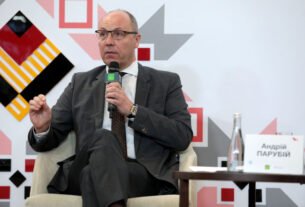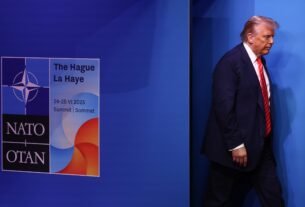The European Commission president used her annual address to the European Parliament on Wednesday to outline how the EU should gear up for a potential military confrontation with Russia and shed its old identity as a mere economic club.
“Our Union is fundamentally a peace project,” she said in Strasbourg. “But the truth is that the world of today is unforgiving.”
Her words landed just hours after Poland shot down Russian drones that entered its airspace during an aerial assault on neighbouring Ukraine, and as Poland’s Prime Minister Donald Tusk warned that the risk of war with Moscow was higher than at any time since 1945.
Von der Leyen said that the message she received on a recent trip to eastern member countries was that “Europe must prepare itself today.” The subtext was clear: Russia poses a direct threat to EU countries, not just Ukraine.
Dressed in an olive-green jacket suggestive of military attire, she proposed a €6 billion scheme to support Ukraine’s armed forces using frozen Russian assets, alongside fresh sanctions extending to “third countries” and plans for a “wall of drones” on the EU’s eastern border with Russia and Belarus.
European officials are in Washington this week to coordinate restrictive measures on Moscow, with the US reportedly pushing Brussels to impose sweeping “secondary tariffs” on India and China to punish them for purchasing Russian fossil fuels.
“Europe will defend every inch of its territory,” she said, in a speech that mentioned the words “fight” and “power” around 30 times.
But her martial rhetoric exposed the limits of Brussels’ authority. Military affairs are largely a national prerogative, and Berlin only recently criticised her for overstepping her mandate by talking about placing European troops in post-war Ukraine.
Calls for higher defence spending also collide with fiscal reality. Many EU countries, including Italy and France, have already been reprimanded by the Commission for blowing past its deficit rules.
She referenced reports she commissioned from former Italian premiers Mario Draghi and Enrico Letta, and talked about the uptake of a new €150 billion defence loans instrument called SAFE. However, she did not offer any fresh ideas to reinvigorate Europe’s anaemic economy.
She did, however, propose softening the EU’s requirement for decisions to be taken by unanimity in foreign and security policy, which could allow Brussels to bypass Hungarian opposition to sending weapons to Ukraine.
Such reforms, she argued, could pave the way towards her vision of a “European Defence Union.”
‘Europe’s independence moment’
In a world of rival power blocs, from Russia and China to the US, von der Leyen repeatedly stressed that Europe must find its own footing. “This must be Europe’s independence moment,” she told MEPs.
The speech also contained several veiled – and not-so-veiled – criticisms of Beijing, which has considerably deepened its economic and political ties to Russia since its full-scale invasion of Ukraine in 2022.
Von der Leyen proposed the creation of “a new, long-term trade instrument” to shield Europe’s struggling steelmakers from cheap, state-subsidised Chinese exports.
“Global overcapacity is squeezing margins” and impeding EU metal manufacturers’ efforts to cut carbon emissions, she said.
The warning came after Donald Trump slapped European steel exporters with a 50% tariff earlier this year, sparking fears that vast quantities of Chinese metals could be redirected and dumped on Europe.
Von der Leyen also strongly defended July’s EU-US trade agreement, arguing that EU firms actually now enjoy “a relative advantage.”
For example, “some of our direct competitors face much higher” levies than the 15% duty now faced by most EU exporters. “We ensured that Europe got the best possible deal out there,” she said.
Her speech opened and closed with rallying calls for Europe to “fight” for its future prosperity and security.
“Europe must fight for its place in a world in which many major powers are either ambivalent or openly hostile to Europe,” she said.
She described a world of “imperial ambitions and imperial wars” in which “dependencies are ruthlessly weaponised”.
“And it is for all of these reasons that a new Europe must emerge,” she said.
Aurélie Pugnet contributed reporting.
(mm)




